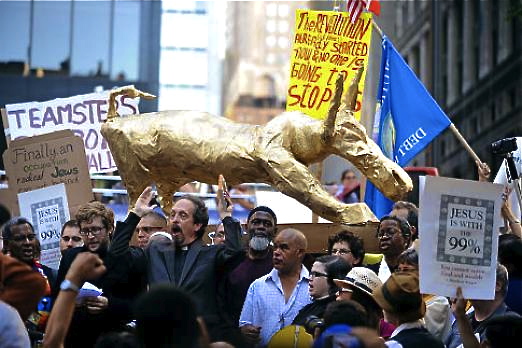Some Christians are making their voices heard in the Occupy Wall Street protest in New York, and the New York Times spoke with some of them:
At Occupy Wall Street and the allied events, there are police officers in the symbolic 99 percent, wearing uniforms. There are self-proclaimed mothers in the 99 percent. There are Marines. There are Muslims and Jews, yoginis and puppeteers. Sometimes they proclaim their tribes on signs in protest-movement Magic Marker; other times their meaningful headgear speaks loud enough: firefighter’s hat, bus driver’s cap, yarmulke.
There are Christians, too, eager to be seen as Christians. They face a special challenge. They want to make the church visible, so they wear clerical collars or other religious garb, like the albs, or white robes, that lay Christians may also wear.
But they know that many, especially on the political left, are wary of Christians, suspicious that these men and women in strange garments are seeking converts. When liberal activists hear “Christian,” they often think “conservative.” Many would thrill to see an imam marching next to them but shudder at a priest.
So committed Christians have different answers to the question, “How Christian should we seem?” Marisa Egerstrom, an Episcopalian who studies religion at Harvard, recognized Occupy Wall Street as a sign of the times, “a continuation of the Arab Spring.” On Sept. 17, she brought a group of 10 Boston-area Christians, including Roman Catholics and Lutherans, to Zuccotti Park in New York.
“We wore white albs,” Ms. Egerstrom said, referring to the long clerical cassocks. “We knew that there would be millions and millions of Christians who see that at their churches every Sunday on the acolytes.” They chanted devotionals from Taizé, the ecumenical Christian community in France, and they sang “Ubi Caritas,” the Gregorian hymn whose lyrics mean, in English, “Wherever there is charity and love, there is God.”
“Whenever we started singing, people just stopped and watched,” Ms. Egerstrom said. “There would be this melting. They would understand this wasn’t just confrontation. The music and harmonies are an expression of hope in the midst of chaos.”
Protest Chaplains, the national network that Ms. Egerstrom started after her visit to New York, has attracted members from many religions, but her original group wanted to communicate the Christian aspect of their witness. “We wanted to connect with the idea that we have obligations under Christian baptism,” she said.












